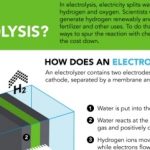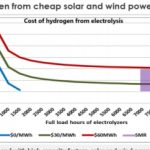Fuel and electrolysis cells both involve electrochemical reactions (one is the reverse of the other), and their efficiency depends on the catalysts used on the electrodes. Conventional metal catalysts coarsen at high temperatures, reducing activity and durability. Elizabeth Thomson at MIT describes new research there that uses ion irradiation to precipitating metal nanoparticles onto the surface of the electrode. The process allows close control … [Read more...]
Improved “Solar Thermochemical” process captures 40% of the sun’s heat to produce Green Hydrogen
The U.S. Department of Energy has set a goal to make green hydrogen domestically at $1 per kilogram by 2030. Current costs range from $3 to $8 and none of it is being done at scale. Getting the cost of green hydrogen down is a serious concern for policymakers and industry alike. Most efforts are through electrolysis, which used electricity to split the water that delivers the hydrogen production. Jennifer Chu at MIT describes research there on … [Read more...]
Making Hydrogen direct from seawater using double-membrane electrolysis
Can hydrogen be produced from seawater? The standard method requires water to be purified, which is expensive to do and adds complexity to the device. David Krause at the SLAC National Accelerator Laboratory, Stanford University describes new research there that uses electrolysis and a double membrane directly on the seawater to separate out the chloride and isolate the hydrogen and hydroxides. The system operates without generating toxic … [Read more...]
Hydrogen’s innovation pipeline: signals strong ahead of World Hydrogen Summit in Rotterdam, May 9-11, 2023
The IEA and the European Patents Office have, for the first time, reported on patents filed worldwide to get a measure of the innovations we’re seeing in the hydrogen sector, summarised here by Ian Shine. Overall, Europe and Japan are leading. Although the U.S. is a close third, with 20% of the total, their filings have declined compared to the previous decade. The fastest growth is in China (15.2%) and South Korea (12.2%). There has been a … [Read more...]
Energy Post Quiz 2021: ANSWERS
Hope you all had fun with the Energy Post Quiz, published before the Christmas break. Here are the answers. There are ten questions, both entertaining and insightful. The answers could all be found in articles that appeared here during 2021, and we give you the links to them. During 2021 Energy Post had another strong year in terms of number of debates hosted, event attendance, and readership for our articles: our readership grew by … [Read more...]
Energy Post Quiz 2021
Energy Post has had another strong year in terms of number of debates hosted, readership growth and event attendance. Our readership has grown by 17.16% year on year. We hosted 14 panel discussions (including 3 for ECECP with an average of 20 panellists from all corners of the globe). Together we've reached hundreds of thousands with our event packages. Our thanks to all our authors. Now, with all those parties cancelled due to Covid you have … [Read more...]
Hydrogen production in 2050: how much water will 74EJ need?
There’s no point ramping up hydrogen if other resource constraints are going to bring it to a halt. Here, Herib Blanco at IRENA summarises their research into how much water will be needed in the production of hydrogen through electrolysis (i.e. from water) and the costs involved. A wide range of analyses have been reviewed to calculate the amount of water used during the hydrogen production, and by the energy source used to power it (renewables … [Read more...]
Clean Hydrogen from water electrolysis: research into catalysts to meet global targets
The full potential of the new hydrogen economy will depend on producing enough clean hydrogen from water electrolysis which uses precious metals. But, as Glennda Chui at SLAC (Stanford University & DoE) explains, there aren’t enough precious metals in the world to get to the scale we need. And their cost is so high the clean hydrogen they generate could never compete with hydrogen derived from fossil fuels. Over 95% of hydrogen produced today … [Read more...]
Hydrogen electrolysis: cheap, abundant Cobalt Phosphide can replace Platinum
Platinum and iridium are the preferred catalysts for producing hydrogen through electrolysis at scale. But they are expensive and rare, offering serious bottlenecks in hydrogen’s plans to replace gas worldwide. Now researchers at the U.S. Department of Energy’s SLAC National Accelerator Laboratory and Stanford University have shown for the first time that cobalt phosphide can do the same job in the harsh environment of a commercial device: high … [Read more...]
The Clean Hydrogen revolution: how, by whom, when?
Hydrogen rivals oil and gas for storage and hard-to-decarbonise sectors (industry, heavy and long distance transport). But it isn’t all carbon free. “Grey” hydrogen – the cheapest at €1.50/kilo - is made from gas. “Blue” hydrogen depends on the fortunes of carbon capture technology. “Green” hydrogen is CO2 free, but needs further cost reductions in the green electricity used in the electrolysis process. Noé van Hulst, at the Netherland’s Ministry … [Read more...]











